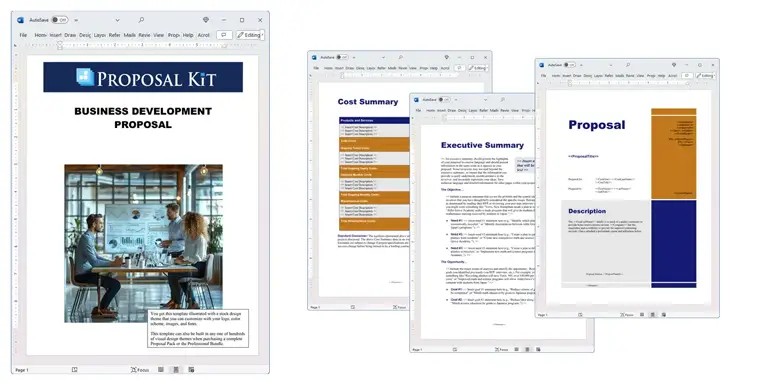How to write your Business Development Proposal
We include this 30 page layout with every Proposal Pack. If you want this template to have a different visual design theme than the one illustrated here, purchase any Proposal Pack design and create this template using the purchased design theme. This template is included in every Proposal Pack. If you get a Proposal Pack or the Professional, you can also make any variation of this template with different chapters to suit your needs.
We typically include more chapters in the templates than most people will need to give everyone more variety in the chapters they may need. You can trim down a long template by removing pages you do not need or combining multiple chapter topics into one page.
 DOWNLOADABLE, ONE-TIME COST, NO SUBSCRIPTION FEES
DOWNLOADABLE, ONE-TIME COST, NO SUBSCRIPTION FEESYou can also create countless variations of this document to suit your needs using the included library of 2200+ chapters if ordering a Proposal Pack or Professional.
 What Our Clients Say
What Our Clients SayThe Networks Proposal Packs saves me a lot of time when responding to RFPs and I feel confident presenting my proposals. The information is organized well and is in a format that makes it easy for the appropriate persons to locate what is important to them. I highly recommend Proposal Packs."
Technology Services Manager
DTC, LLC
Related Article
Related Video
Related Templates
- New Sales Office Proposal
- Business Growth Services Proposal
- Franchise Selling Proposal
- Growing Company Globally Proposal
- Joint Venture Proposal
- Strategic Business Plan
- New Office Space Purchase and Relocation Proposal
- New Office Location Business Plan
- Ecommerce Proposal Template
- Strategic Plan
- Business Development Proposal Template
- Strategic Plan for Mobilization and Deployment of Project
- Transforming Retail Business to Service Online Proposal
- Succession Planning Proposal
- Market Access Recovery Proposal Template
- Retail Location Business Plan
- Strategic Business Map
- Strategic Alliance Proposal
- Failing Business Turnaround Proposal
- Merger of Companies Proposal
- Medical Practice Startup Business Plan
- Business Case Document
- SWOT Analysis Report
- Pharmacy Startup Business Plan Funding Proposal
- BANT Sales Proposal Template
- Organizational Development Proposal
- Business Strategy Change and Implementation Proposal
- Technology Strategy Analysis
Writing a Business Development Proposal with Proposal Kit
Developing a robust business development strategy is crucial. A company's growth and expansion depend on its ability to chart a future direction. This is where a business development proposal plays a pivotal role. Similar to a business plan but sans the extensive financial chapters, such proposals can be crucial stepping stones for companies. We'll cover how to write a compelling business development proposal using Proposal Kit's template library and Wizard software program.
Think about your current business challenges. Do you see a need for a structured approach to grow and develop your business?
The Best Way to Write a Business Development Proposal
For someone new to proposal writing, the process might seem daunting. However, Proposal Kit simplifies this task. The first step involves selecting appropriate templates from the library. These templates are designed to cover various aspects of a proposal, making the process user-friendly. The Wizard software aids in assembling these templates into a structured document.
An integral part of a business proposal is the financial aspect, such as cost summaries, quotes, estimates, and budgets. Proposal Kit's system includes a line item quoting database, making it easier to integrate these financial elements into your proposal.
What Types of Projects Are Business Development Proposals Written For?
Business development proposals can span a wide range of projects. Some examples include:
- Launching a new product or service.
- Expanding into new markets.
- Developing strategic partnerships.
- Implementing new technology solutions.
- Corporate restructuring for efficiency.
- Acquiring new clients or customer segments.
- Enhancing corporate branding and marketing strategies.
- Research and development initiatives.
- Employee training and development programs.
- Implementing sustainability and CSR initiatives.
Chapters this template is built with
The Proposal Kit offers thousands of chapter templates, making it versatile for various needs. Some key templates that are particularly useful for this type of proposal include.
Together, these elements form a comprehensive and coherent structure for a business development proposal. Each section plays a crucial role in presenting a well-rounded, persuasive, and practical blueprint for business growth and development.
These templates are just a small selection from the thousands available in the Proposal Kit library, allowing for a high degree of customization.
Executive Summary
The Executive Summary is the gateway to your proposal. It succinctly presents the core of your proposal, highlighting the main objectives, strategies, and expected outcomes. This section is crucial as it sets the tone and provides a snapshot of what's to follow, making it critical for capturing the reader's interest.
Cost Summary
In the Cost Summary, you detail all financial aspects of the project. This includes a breakdown of costs such as materials, labor, and overheads, as well as a projection of the required budget. Transparency and accuracy in this section are vital to build trust and convey financial prudence.
SWOT Analysis
SWOT Analysis is a strategic planning tool used to identify the Strengths, Weaknesses, Opportunities, and Threats related to your project. Strengths and weaknesses are internal factors, while opportunities and threats are external. This analysis is essential for understanding the project's potential and risks.
Opportunities
This section is dedicated to identifying and elaborating on potential areas for growth or improvement that the proposal will address. It's about recognizing market gaps, emerging trends, and unexplored avenues that the project can capitalize on.
Competitive Analysis
Competitive Analysis involves assessing your competitors and understanding your strategic position relative to them. It includes analyzing competitors' strengths, weaknesses, market share, and strategies. This insight is crucial for developing strategies to outperform rivals.
Growth Areas
Growth Areas focus on potential sectors or aspects of the business that can be developed or expanded. This could include new product lines, market expansion, diversification, or technology upgrades. Identifying these areas is key to long-term sustainability and success.
Action Plan
The Action Plan outlines the specific steps needed to implement the proposal. This includes timelines, milestones, responsibilities, resources needed, and contingencies. A well-structured action plan is essential for efficient project execution.
Strategy
This section defines the overarching strategy to achieve the objectives set out in the proposal. It involves outlining the approach to market penetration, resource allocation, branding, and operational changes. The strategy should align with the company's overall vision and mission.
Project Management
Project Management involves planning, organizing, and overseeing the project's execution. This section should detail the project's lifecycle, from initiation to completion, including project governance, team roles, and management tools to be used.
Cost/Benefit Analysis
Cost/Benefit Analysis evaluates the financial feasibility of the proposal by weighing the expected benefits against the costs. This analysis helps in determining whether the project is economically viable and aids in making informed investment decisions.
Company Operations
This part discusses how the project will integrate with or affect current operations. It examines the project's impact on existing workflows, resources, staff, and overall business processes, ensuring that the integration is smooth and enhances operational efficiency.
Strategic Position
Strategic Position defines the company's stance in the market in relation to the project. It involves understanding how the project aligns with the company's broader goals, how it positions the company in the market, and how it influences the company's competitive advantage.
Use cases for this template
Ethan's Construction Breakthrough
Ethan, who owned a construction firm, found himself at a critical juncture. The opportunity to bid on a large-scale municipal project presented itself, a project that could significantly elevate his company's status and revenue. However, the complexity of the proposal process was daunting.
Ethan turned to Proposal Kit, which proved to be a game-changer. He used its templates to structure his proposal, ensuring all necessary aspects were covered. The Cost Summary template helped him present a detailed and transparent budget, assuring the project's financial feasibility. The SWOT Analysis allowed Ethan to strategically highlight his firm's strengths, particularly their innovative construction techniques and strong safety record, while addressing potential challenges head-on.
His Executive Summary was concise yet powerful, capturing the essence of his company's capability to handle such a significant project. The Project Management section demonstrated a clear, step-by-step plan for project execution, showcasing his team's expertise and preparedness.
Ethan's proposal, enhanced by the clarity and professionalism that Proposal Kit provided, stood out among competitors. His firm was awarded the project, marking a significant milestone in its growth trajectory.
Sophia's AI-Driven Proposal
Sophia, a developer in a tech company, faced a challenging task. Her company sought to enhance their flagship SAAS product with advanced AI features, aiming to outshine competitors. The catch? The proposal had to be ready within a stringent deadline for the upcoming board meeting.
Using Proposal Kit, Sophia efficiently organized her ideas and data. The Strategy section outlined how integrating AI would significantly improve user experience and data analysis capabilities. Her Competitive Analysis was thorough, illustrating how this enhancement would position the product ahead of market rivals.
The Cost/Benefit Analysis she included was particularly persuasive, demonstrating the long-term benefits against the initial investment in AI technology. The Action Plan section laid out a clear roadmap for the development and implementation phases, assuring her superiors of her plan's feasibility and timelines.
Sophia's proposal, thanks to the comprehensive and structured approach facilitated by Proposal Kit, was not only completed on time but also received acclaim from her superiors for its thoroughness and visionary outlook. The project was greenlit, setting the stage for a transformative upgrade to their SAAS product.
Liam's Humanitarian Mission
Liam, a dedicated volunteer at an international non-profit, faced a significant challenge. The organization aimed to expand its relief services globally, requiring substantial collaboration and funding. The task at hand was to create a Request for Proposal (RFP) to attract potential partners and funders.
Leveraging Proposal Kit, Liam wrote an RFP that was both compelling and comprehensive. The Executive Summary vividly detailed the non-profit's mission and the urgent need for expanded services. The Opportunities section was particularly striking, outlining the potential impact of expanded relief services on communities worldwide.
His SWOT Analysis provided a transparent view of the organization's current capabilities and the external factors that could influence the project's success. The Strategic Position section elucidated how the expansion aligned with the organization's long-term goals.
The RFP, enriched by Proposal Kit's structured format, resonated with various corporations and NGOs, leading to successful partnerships and funding. Liam's effort thus marked a turning point in the non-profit's ability to deliver aid on a larger scale, ultimately facilitating greater global impact.
In each situation, Proposal Kit played a pivotal role, transforming complex proposal challenges into structured, persuasive, and successful documents. These stories exemplify how individuals and organizations, regardless of their size or sector, can leverage Proposal Kit to achieve their objectives and drive growth.
Conclusions and Recommendations
Whether you're a small business owner like Ethan, an employee in a large corporation like Sophia, or part of a non-profit organization like Liam, Proposal Kit offers the tools and resources to create effective business development proposals. By utilizing its comprehensive template library and user-friendly software, individuals and companies can address their unique challenges and succeed in their ventures. Remember, a well-written proposal is not just a document; it's a roadmap to growth and success.
Also Known As
This template may also be referred to in different ways or be used in more specialized situations, such as:
- Business Expansion Plan
- Strategic Partnership Proposal
- Market Growth Strategy
- Commercial Initiative Outline
- Business Opportunity Document
- Corporate Development Scheme
- Financial Enhancement Proposal
- Business Innovation and Growth Plan
- Client Acquisition Strategy
- Revenue Enhancement Strategy
Abstract
 Creating a business development proposal is important for a company's growth and future direction. A business development proposal helps navigate a company's expansion without delving deeply into financial details like a business plan would. Proposal Kit offers a solution with its comprehensive template library and Wizard software, making the task of writing a business proposal more approachable, especially for newcomers. These resources support the creation of effective business proposals by providing well-structured templates that address various topics, such as cost summaries and SWOT analyses. The software simplifies the process of assembling these topics into a clear, persuasive business proposal template that can address the needs of prospective clients and potential investors.
Creating a business development proposal is important for a company's growth and future direction. A business development proposal helps navigate a company's expansion without delving deeply into financial details like a business plan would. Proposal Kit offers a solution with its comprehensive template library and Wizard software, making the task of writing a business proposal more approachable, especially for newcomers. These resources support the creation of effective business proposals by providing well-structured templates that address various topics, such as cost summaries and SWOT analyses. The software simplifies the process of assembling these topics into a clear, persuasive business proposal template that can address the needs of prospective clients and potential investors.
Business development proposals are tailored for varied projects, from launching new products to expanding market reach, social media marketing, and enhancing corporate strategies. The Proposal Kit includes templates for creating components like executive summaries, action plans, and competitive analyses, which are crucial for a winning business proposal. Notably, the executive summary sets the stage by succinctly presenting objectives and expected outcomes, engaging readers from the start. Cost summaries ensure transparency in budgeting, while SWOT analyses illuminate both the strengths and challenges the proposal tackles. By using these tools, individuals have successfully overcome complex proposal challenges, demonstrating how Proposal Kit can turn daunting tasks into structured, compelling proposals that drive business success.
Business development proposals are critical in steering a company's growth and exploring new opportunities. Using Proposal Kit, these proposals become more than just documents; they transform into roadmaps that communicate a company's value proposition to prospective clients and decision-makers. By incorporating a variety of business proposal examples, Proposal Kit enables businesses to create well-written proposals that cater to both formally solicited and unsolicited business proposals, ensuring they meet the diverse needs of potential clients.
 These proposals often begin with a good executive summary, capturing the reader's attention by highlighting the company's strengths and setting clear expectations. A key part of any proposal is the detailed problem statement, which identifies customer pain points and outlines proposed solutions to address them. This is followed by a project description, which provides a clear picture of the project scope, including a project timeline and a payment schedule, ensuring potential customers have all the details needed for informed decision-making.
These proposals often begin with a good executive summary, capturing the reader's attention by highlighting the company's strengths and setting clear expectations. A key part of any proposal is the detailed problem statement, which identifies customer pain points and outlines proposed solutions to address them. This is followed by a project description, which provides a clear picture of the project scope, including a project timeline and a payment schedule, ensuring potential customers have all the details needed for informed decision-making.
To make the entire proposal more compelling, the Proposal Kit emphasizes the importance of a competitive analysis and a robust growth strategy. By analyzing competitors and market trends, businesses can identify growth areas and tailor their proposals to reflect a clear understanding of market demands. This is further reinforced by the use of client testimonials and social proof, adding credibility and demonstrating the company's capability through past client experiences.
The Proposal Kit also guides users in presenting a persuasive business proposal format that includes visually appealing topics such as graphics and charts to illustrate key points, ensuring the document is not only informative but also engaging. Moreover, the inclusion of a cost/benefit analysis provides a comprehensive breakdown of the financial viability of the project, highlighting both the potential revenues and the required resources.
 By addressing legal and formal document requirements, such as digital signatures and business agreements, the Proposal Kit ensures that proposals are not only persuasive but also compliant and ready for formal submission. Whether for a small business owner aiming to capture new market segments or a large corporation seeking to enhance its partnerships, Proposal Kit equips users with all the necessary tools to produce winning business proposals that stand out and drive business success.
By addressing legal and formal document requirements, such as digital signatures and business agreements, the Proposal Kit ensures that proposals are not only persuasive but also compliant and ready for formal submission. Whether for a small business owner aiming to capture new market segments or a large corporation seeking to enhance its partnerships, Proposal Kit equips users with all the necessary tools to produce winning business proposals that stand out and drive business success.
Creating a compelling business development proposal is essential for driving business success and exploring new opportunities. A well-written business proposal not only communicates your company's value proposition but also addresses the client's problems with proposed solutions. Using Proposal Kit's business proposal templates and examples, businesses can efficiently write a business proposal that meets the diverse needs of potential clients and prospective customers.
An effective business proposal begins with a good executive summary, capturing the reader's attention by highlighting the company's strengths and setting clear expectations. This concise overview provides a clear understanding of the project's goals and the company's unique selling points. Following the executive summary, a detailed problem statement identifies customer pain points, outlining how the proposed solutions will address these issues. This demonstrates a clear idea of the client's needs and establishes your company as the best choice to solve their problems.
 The proposal should include a project description that offers a clear picture of the project scope, including a project timeline and a payment schedule. This ensures that potential customers and potential clients have all the details needed for informed decision-making. Incorporating a competitive analysis and growth strategy adds credibility by showing a thorough understanding of the industry and market research. By identifying growth areas and analyzing competitors, the proposal reflects a clear structure and strategic position that appeals to decision-makers and C-level executives.
The proposal should include a project description that offers a clear picture of the project scope, including a project timeline and a payment schedule. This ensures that potential customers and potential clients have all the details needed for informed decision-making. Incorporating a competitive analysis and growth strategy adds credibility by showing a thorough understanding of the industry and market research. By identifying growth areas and analyzing competitors, the proposal reflects a clear structure and strategic position that appeals to decision-makers and C-level executives.
Adding client testimonials and social proof further enhances the proposal's persuasiveness. Past clients' experiences and industry awards add credibility and demonstrate the company's capability to deliver on its promises. Visually appealing elements like graphics and charts can make the entire document more engaging, highlighting key points and essential elements in an easily digestible format.
A cost/benefit analysis is a crucial component, providing a detailed breakdown of the financial aspects. This includes pricing tables, pricing options, and a cost summary, offering potential investors and prospective buyers transparency regarding the required resources and expected returns. Addressing legal and formal document requirements, such as digital signatures and business agreements, ensures the proposal is ready for formal submission and complies with all necessary regulations.
 By following best practices and focusing on key components like the value proposition, scope of work, and proposed solutions, businesses can craft compelling business proposals. Whether dealing with formally solicited or unsolicited business proposals, the Proposal Kit aids in creating documents that are not only persuasive but also tailored to the target audience and target client.
By following best practices and focusing on key components like the value proposition, scope of work, and proposed solutions, businesses can craft compelling business proposals. Whether dealing with formally solicited or unsolicited business proposals, the Proposal Kit aids in creating documents that are not only persuasive but also tailored to the target audience and target client.
Writing a business development proposal with Proposal Kit transforms the task into a manageable and efficient process. By utilizing its comprehensive template library and Wizard software, small businesses, especially, can create well-written business proposals that address client needs, solve problems, and pave the way for new business opportunities. This approach not only saves time but also increases the chances of winning business proposals and achieving business goals.
Frequently Asked Questions
What should be included in a business development proposal?
A business development proposal should include an executive summary, a clear statement of the problem or opportunity, a detailed description of the proposed solution or plan, an analysis of the market and competition, a breakdown of the required resources and budget, a timeline for implementation, and metrics for measuring success. Each section should be concise yet comprehensive, providing enough detail to persuade stakeholders of the proposal's feasibility and potential benefits.
How do I make my business development proposal stand out?
To make your business development proposal stand out, tailor it to your audience's specific needs and priorities. Use compelling data and case studies to support your claims, and present your ideas clearly and logically. To enhance readability and impact, incorporate visuals, such as charts and graphs. Additionally, ensure your proposal is professionally formatted and error-free, demonstrating your enthusiasm and commitment to the project.
How long should a business development proposal be?
The length of a business development proposal can vary depending on the project's complexity and the stakeholders' requirements. However, it is generally advisable to keep it concise and focused, typically between 10 and 20 pages. The key is to provide enough detail to support your recommendations and keep the reader manageable. Use appendices for any additional information that may be relevant but not critical to the main proposal.
How do I conduct a market analysis for my business development proposal?
To conduct a market analysis for your business development proposal, identify your target market and gather relevant data on its size, demographics, and purchasing behavior. Research your competitors to understand their strengths and weaknesses, and analyze market trends that could impact your business. Use this information to assess the potential demand for your product or service, identify market gaps, and develop strategies to differentiate your offering. Present your findings clearly and concisely, supported by data and visual aids.
What are the common mistakes to avoid when writing a business development proposal?
Common mistakes to avoid when writing a business development proposal include failing to clearly define the problem or opportunity, neglecting to tailor the proposal to the audience's needs, providing insufficient or unconvincing data, and overlooking the importance of a well-structured, logical flow. Also, avoid jargon or overly complex language, and ensure your proposal is free from grammatical and typographical errors. Finally, neglecting to include a clear call to action or next steps can undermine the proposal's effectiveness in driving decision-making.
20% Off Discount
![]() Add To Cart This Word Template
Add To Cart This Word Template
 Add To Cart Proposal Pack for Any Business
Add To Cart Proposal Pack for Any Business
 Add To Cart Proposal Kit Professional
Add To Cart Proposal Kit Professional
 4.7 stars, based on 849 reviews
4.7 stars, based on 849 reviewsProposal Kit chapters used in this template
Cover Letter, Title Page, Table of Contents, Executive Summary, Opportunities, Goals and Objectives, SWOT Analysis, Growth Areas, Market and Audience, Competitive Analysis, Strategic Position, Position Statement, Strategy, Development, Project Management, Contingencies, Assumptions, Marketing Plan, Implementation Plan, Services Provided, Products, Future Potential, Cost Summary, Cost/Benefit Analysis, Recommendations, Action Plan, Company History, Company Operations, Mission Statement, Back Page
Line Item Automated Chapters
If you purchase a Proposal Pack or the Professional Bundle, these proposal pages are generated using an automated line-item database in the included Wizard software.
Cost Summary, Implementation Plan, Cost Benefit Analysis
You use this proposal for
- General business proposal
- Non-technical proposal
- Project pitch proposal
- Business plan, loan, investor funding proposal
- Internal company proposal
How to create this template with Proposal Pack Wizard
You can create this document using any of the logo-designed Proposal Packs. Pick any Proposal Pack with a logo design theme you like best; they will all work equally well. The Proposal Pack for Any Business is the pack with no extra added logos or colors - designed to be used plain or for you to customize with your logos and graphics.
The Proposal Pack design theme you purchase will determine the visual look of this template. The screenshot above only shows the plain generic design theme.
We include a library of chapters to be assembled based on your needs. All proposals are different and have different needs and goals. We designed Proposal Pack so you can customize the documents to suit your needs.
You will best create this document using the Proposal Pack Wizard - Expert Edition software to select this template and build it in the Proposal Pack logo design theme of your choice along with any desired customizations (such as adding additional chapters, removing unneeded chapters, changing the order of chapters, and importing your company logo). This template outlines a proposal for the described situation. Each user is responsible for typing in the actual content of the provided pages with their information to complete the proposal. Suggestions in the abstract may include features in higher-end packages and are facilitated by the selection of chapter templates to support the narrative of each proposal, which help guide the user in filling in the details.
The Wizard software's AI Writer will write the content of the pages of the template based on details provided for your company, client, project, financial details and other writing instructions. This will provide a personalized version of the template completely written and ready to edit.
Once finished, the AI Writer's Word-to-PowerPoint converter can transform your proposal, business plan, or other business documents into a PowerPoint slideshow. Save time and effort by letting the AI analyze every chapter to condense its content into talking points, visually matching the document, and providing a consistent package of presentation material with the click of a button.
You create this template using the Wizard software with an entire Proposal Pack library and software. We include the Expert Edition of the software in the Proposal Kit Professional. Microsoft Word for Windows is required to use the customizing software. You can also edit Word document templates in other office software such as Word for Mac. We will assist Mac users in assembling complex templates for their first project if they do not have the required platform to run the Wizard software.
How to Build Templates Featured on Proposal Kit Website
Many people find the Proposal Kit website after searching for a specific proposal. Once you've purchased and installed the software, how do you build that template you found in the first place? This video shows you how to build any proposal you see on the Proposal Kit website.
 Ian Lauder has been helping businesses write their proposals and contracts for two decades. Ian is the owner and founder of Proposal Kit, one of the original sources of business proposal and contract software products started in 1997.
Ian Lauder has been helping businesses write their proposals and contracts for two decades. Ian is the owner and founder of Proposal Kit, one of the original sources of business proposal and contract software products started in 1997.By Ian Lauder
 Published by Proposal Kit, Inc.
Published by Proposal Kit, Inc.


 Cart
Cart
 Get 20% off ordering today:
Get 20% off ordering today: 


 Facebook
Facebook YouTube
YouTube Bluesky
Bluesky Search Site
Search Site